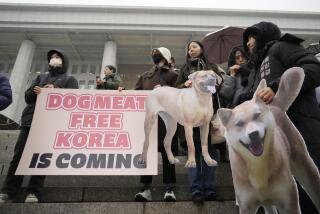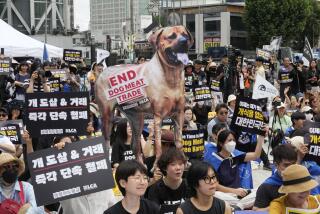Proposed Cow Slaughter Ban Stirs Discord in India
- Share via
COCHIN, India — As a Hindu, Anil Kumar is expected to revere cows, not eat them, and his taste for beef defies one of Hindu nationalism’s most fervent causes.
Cows are treated as goddesses by most in the Hindu majority. But Kumar has been free to eat beef since he was young -- his mother thought it would make him stronger -- because he lives in southern India’s Kerala state, where leftist governments have long defended the slaughter of cattle as a fundamental freedom.
In the name of religious tolerance, Indian governments have long resisted pressure to impose a nationwide ban on cattle butchering, because millions of Indian Muslims and Christians -- and even many Hindus -- happily eat beef.
But a national election is coming, and the voice of Hindu nationalists is getting louder. To some in the opposition, it’s no coincidence that Prime Minister Atal Behari Vajpayee’s coalition government, which is dominated by Hindu nationalists, is moving to make it a serious crime to injure or kill cattle.
Last month, Vajpayee’s government brought the Prevention of Cruelty to Cows bill to Parliament. If it becomes law, anyone caught killing cattle will face a prison term of two to seven years and a fine of up to $220 for each dead animal.
The law would also punish those who injure cattle, with a fine of up to $110, prohibit the sale of beef and end the legal export of cattle.
Like many Muslims and Christians opposed to the proposed ban, Kumar thinks leaders of Vajpayee’s Bharatiya Janata Party are cynically trying to stir up passions with the proposed ban. “This is not coming from inside their hearts,” he said. “People in power must have tasted beef in their [college] hostels.”
Kumar started eating beef when he was in high school, breaking the traditional Hindu taboo with his mother’s encouragement. She thought a diet of red meat would toughen him up to defend the family’s privileged status as Brahmins at the top of India’s rigid caste system.
“The feeling slipped into the minds of high-caste Hindus that we are useless because we are not aggressive,” said Kumar, 38, state sales manager here for a home appliance firm. “When I was a child, my mother used to say, ‘People who eat beef are stronger.’ ”
At the time, Kerala’s Communist government was taking land from Brahmins and giving it to their low-caste Hindu, Muslim and Christian laborers. Kumar’s mother thought vegetarianism had weakened the Brahmin resolve, he said.
So she allowed beef to be served at her table, as long as it wasn’t cooked in the house, a rule that still stands in Kumar’s home. The neighbors don’t complain because most of Kerala’s Hindus are beef eaters, Kumar says.
For centuries, most Indian Hindus have considered cows sacred and allowed them to roam freely in the streets. Today, pedestrians in India’s crowded cities share sidewalks with herds of wandering cattle. Cars give way to cows dozing in the middle of the road, all in deference to the most holy of animals.
Yet cattle slaughter is legal in several Indian states, including Kerala, Tamil Nadu and West Bengal and in the country’s northeast. Their governments are fighting New Delhi’s proposed ban, arguing that it violates the constitution and would kill important local industries, such as meat and leather production.
There are about 140 million Muslims in India, and many eat beef at traditional feasts to celebrate Bakr-Id, an April festival that celebrates Abraham’s willingness to sacrifice his son at God’s command.
Members of Vajpayee’s own coalition joined the opposition to the bill when the government tried to introduce it to Parliament. Some called it an attack on India’s basic rights, others a violation of state governments’ authority. So the bill went to an all-party committee for more discussion.
The BJP expects to get enough support, especially from allied parties, to have the bill passed into law in the coming legislative session, party spokesman Muktar Naqvi said in a phone interview.
Naqvi, a Muslim, denied that the ban is aimed at any religion and insisted it is justified because similar laws are already on the books in most Indian states.
“There is a very long-pending demand from a large section of the people, and some organizations,” Naqvi added. “That is why the ruling BJP wants it.”
In 2001, India’s government appointed a National Commission on Cattle, headed by a judge and former member of Parliament.
It held public hearings across India for almost a year and submitted a four-volume, 1,400-page report in July 2002.
It said official records show that more than 20 million cattle are slaughtered each year in India, while many more are killed for the black market to skirt bans in some states and health officials in others. The commission report charged that “many vote-greedy politicians, a few money-greedy Hindus and fanatic fundamentalist Muslims all have joined hands against the speechless cow.”
Like many critics of the proposed ban on cattle slaughter, Muslim butcher K.M. Aslam thinks the Vajpayee government is just making a show of standing up for cows.
“This move is purely aimed at getting votes and securing a majority in the next parliamentary elections,” he said. A severed calf’s head lay in a pool of blood at his feet.
“Once, and if, the BJP comes to power, they would not pursue the ban -- a lot of BJP leaders who are beef eaters would not allow that to happen.”
Aslam, 37, works in his family’s butcher stall at the Mattancherry slaughterhouse here in this southern Indian city, an ancient port in Kerala. The state had 774 legal slaughterhouses in 2001, when about 45,000 tons of beef were slaughtered, according to the most recent state government figures.
Aslam does a steady business, with as many as 30 customers a day, doubling to about 60 on Sundays, when local Roman Catholics buy beef for their Sabbath dinner. But Hindus buy most of it, Aslam said.
“Why, even some high-caste Brahmins are also eating beef,” he added. “Incidentally, 60% of my customers are Hindus from this Mattancherry area, and several of them are BJP activists. In fact, more Hindus eat beef here than Muslims.”
The proportion of Muslims and Christians in Kerala is roughly the same, with each making up about 20% of the state’s population. The Hindu majority constitutes almost 60%.
Cattle slaughter is an emotional issue that has provoked uprisings, riots and killings over the centuries in India. In the late 19th century, protests against cow slaughter challenged British rule over the subcontinent.
Dara Singh, a Hindu activist sentenced to death last month for burning an Australian Christian missionary and his two sons to death in 1999, started out by torching trucks carrying cattle to slaughter after liberating the animals. Several groups still venerate him as the savior of Hinduism.
A ban on cow slaughter would be the death of an important industry in Kerala that provides not only meat, but ground-up bone for fertilizer and blood for nutritional supplements, said Chirakkaaudiyil Ebrahim Bashir, secretary of Cochin’s municipal government.
Beef prohibition would also throw thousands of people out of work, upset the natural balance between livestock and humans and violate India’s constitution, warned Bashir, a Muslim. Many of the state’s butchers will simply go underground and serve beef eaters on the black market if New Delhi declares their work illegal, he added.
“It’s a restriction on fundamental rights,” he said. “If people want to eat beef, they can eat it.”
More to Read
Sign up for Essential California
The most important California stories and recommendations in your inbox every morning.
You may occasionally receive promotional content from the Los Angeles Times.













